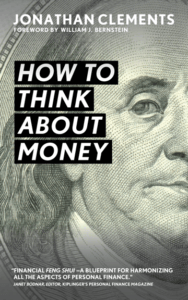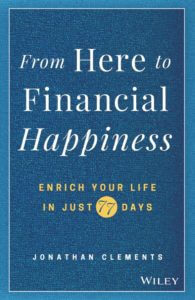Jonathan Clements's Blog, page 367
April 12, 2019
A Great Gift
I OFTEN TALK with estate planning attorneys���and they tell me that individuals typically complete an estate plan just twice in their lives: upon marriage and upon retirement.
On the one hand, this is good. Major life changes warrant a review of your estate plan and an update to key documents. On the other hand, this is not so good. Much like other areas of your financial life, your estate plan needs to be reviewed on a regular basis.
My experience has been that most folks know they need to get their estate plan done, but they aren���t as motivated as they need to be. Even when they are motivated, the process simply gets placed on another ���to-do��� list. After all, who wants to spend part of their weekend thinking about death and incapacity?
Completing your estate documents can be one of your greatest gifts to your family. That gift will be given at an incredibly difficult time, but will be enormously appreciated. You have the opportunity to guide how the end of your life and your estate are handled���and to do so while you still have the ability to make those tough decisions. Leaving an array of questions for your loved ones to answer will only make that time even more upsetting.
Why should you review and update your estate plan more than twice in your life? Changes in your family, your business and the tax rules are all good reasons to review your plan. Here are three examples of what I mean:
1. Estate tax exemption and clawback.��Thanks to 2017���s Tax Cuts and Jobs Act, the federal estate tax exemption is now $11.4 million per person, or $22.8 million per married couple. This means you can bequeath up to this amount and avoid estate taxes. The IRS has also provided guidance that, if you gift this amount during your lifetime and die when the exemption is reduced after 2025, you won���t be subject to any ���clawback��� taxes.
2. Federal vs. state tax law.��Despite the increase in the federal estate tax exemption, some states continue to have a lower threshold for estate or inheritance taxes. Depending on which state you live in, your assets may be subject to state estate taxes, even if they avoid federal estate taxes. With careful planning, you could minimize this state tax hit.
3. Fair does not mean equal.��If I���ve learned one thing in my business life, it���s this: Everyone has a different definition of fair. For example, if you have two children, and one has a successful career and the other has special needs, do you leave them the same amount of assets? What if one child wants to take over the family business and the other wants no part of it? By regularly revisiting your estate plan, you can ensure you make the right decisions for your family���s circumstances.
 Ross Menke is a certified financial planner and the founder of Lyndale Financial, a fee-only financial planning firm in Nashville, Tennessee. He strives to provide clear and concise advice, so his clients can achieve their life goals. Ross���s previous blogs include Bad Timing,��Never Too Late��and��Head Games. Follow Ross on Twitter @RossVMenke.
Ross Menke is a certified financial planner and the founder of Lyndale Financial, a fee-only financial planning firm in Nashville, Tennessee. He strives to provide clear and concise advice, so his clients can achieve their life goals. Ross���s previous blogs include Bad Timing,��Never Too Late��and��Head Games. Follow Ross on Twitter @RossVMenke.
The post A Great Gift appeared first on HumbleDollar.
April 11, 2019
Get the Point
I���M A DEADBEAT. That���s what companies call people who pay off their credit cards in full every month and hence don���t incur interest. But I���m more than that. I���m a leverager. I leverage points and stars and credits everywhere I go.
Let me count the ways.
When I go to the gas station, I use my American Express card and my Exxon rewards card. I get credits from Exxon for buying the gas, which I apply to future gas purchases, plus I get triple points on my Amex card for the gas purchase, which I then use to pay my Amex bill.
My Starbucks membership earns me stars for my next latte and lots of other stuff, too. It also garners me free coffee on my birthday. What a deal. Back in February, I used stars to buy a package of sopressata and cheese to add to my Super Bowl sandwich.
My bank credit card gives me airline miles. I have enough miles for two round-trip first class tickets to anywhere. I haven���t flown that airline in years, but I���m going to use those miles. I can also use those miles to buy all kinds of other stuff. I took a cruise, and they gave me 50,000 extra miles and $200 to spend on the ship. On top of that, I earned more miles by using the card to pay for the cruise. Got that? Yeah, it���s complicated.
My hotel club card gets me a free bottle of water���whoopee���but it also got me four free nights at a hotel in London. Needless to say, as I accumulate points on the hotel card, I also get miles or points on the credit card. Talk about compounding. I just checked my balance. I���m thinking about a few free nights in Paris.
Then there���s my supermarket card���actually a phone app���which got me a free turkey last Christmas. Let���s think about this: I use my supermarket card for discounts, accumulate points for dollars spent, get a turkey, pay for the groceries with a credit card and then pay part of the credit card bill with the points I got for grocery shopping. You following me?
But it gets better. When I use my daughter���s Amazon Prime account and check out, the site asks if I want to use my accumulated Amex points to pay the bill, which have already been conveniently converted to cash value. Which is either very cool or very scary.
My purchases are being monitored, advertising targeted at me and my customer loyalty toyed with. But hey, I���m going to use those cards anyway. I want my free hotel stays and free flights. Starbucks gets my cash in advance when I load its app. But who cares? it���s convenient and, gee whiz, the company remembers my birthday. I know I am being used. But I���m a sucker for special treatment or, at least, it feels special.
Oh, and one last thing: I used Amex points to buy the iPad on which I wrote this article.
 Richard Quinn blogs at QuinnsCommentary.com. Before retiring in 2010, Dick was a compensation and benefits executive. His previous articles include Poor Judgment,��How to Blow It��and��Don’t Call Me That.��Follow Dick on Twitter��@QuinnsComments.
Richard Quinn blogs at QuinnsCommentary.com. Before retiring in 2010, Dick was a compensation and benefits executive. His previous articles include Poor Judgment,��How to Blow It��and��Don’t Call Me That.��Follow Dick on Twitter��@QuinnsComments.
The post Get the Point appeared first on HumbleDollar.
April 10, 2019
Elon and Me
IN MARCH, I drove off the Tesla lot in a new Model 3 with Ben Franklin���s quote in my head: ���So convenient a thing to be a reasonable��creature, since it enables one to find or make a reason��for everything one has a mind to do.���
Elon Musk had just announced availability of lower cost versions of the Model 3. After eight years of waiting for a Tesla that would cost less than my first home, I had my new electric vehicle (EV) just three days after ordering. No deposit, almost no waiting.
Built in California, the car cost less than my wife���s Audi, I told myself. It was way cheaper than the Tesla Roadster or Model S I���d drooled over for years, I rationalized. It���ll get across the corporate campus much quicker, a time saver in my new job. Its styling is so slick, so un-EV, so gotta-have-it. Reasonable indeed.
Jonathan Clements���s sage advice���that, if your goal is greater happiness, buying experiences beats buying more stuff���made me pause before I hit submit on the Tesla online purchase form. Is this another thing I���ll regret spending hard-earned money on, or will it be years of commute therapy and fun driving experiences? How long will that last? I decided to find out.
Wifey and I buy cars rarely and drive them a long time. But a desire to vote with my wallet on electric vehicles changed that pattern. I���ve driven EVs since 2011, when I first got ���Lucky,��� the only car I���ve ever leased and one of the first Nissan LEAFs in Seattle. The battery in that car was too small for anything but commuting and it recharged slowly, but for me it was a game changer.
EVs are far simpler than their combustion engine cousins. With no engine, transmission or gas tank, they���re far cheaper to maintain. Forget about oil changes, transmissions which break and water pumps lasting half the life of the car. They���re also loads of fun to drive, with electric motors giving 100% torque when you tap the accelerator, and incredible cornering from a low center of gravity, thanks to heavy, ground level batteries.
I have three bits of advice if you���re new to EVs and are considering buying one:
1. Battery size is crucial.��Skip frivolous options and use your budget to buy the biggest battery you can get. In Tesla���s Model 3, get the ���long range��� one. Range estimates for EVs are always optimistic. Real EV range is less than estimates in cold weather, when driving fast for long distances on the highway, or driving in hilly or mountainous areas. Manufacturers also recommend charging batteries to something less than 100% of a full charge, so you���ll see less capacity loss over time.
2. Buy a 240-volt charger if you own your home.��These devices will let you recharge way faster than a standard 120-volt outlet. They run about $500, plus the cost of an electrician, but it���s worth it. In a Model 3, the higher-voltage charger is the difference between adding 44 miles of range after spending an hour in the garage, rather than a mere five. Buy one from Tesla���s online shop or, if you���re getting another EV brand, from reliable makers like ClipperCreek.
3. Sign up for charging networks.��Tesla has an extensive, proprietary national network for fast charging. There are other charging station networks across the country, including ChargePoint. These mainly use industry standard connectors. Tesla provides an adapter for the most common one. You���ll need to sign up for an account with these other charging networks before you can use them. Do it when you get the car, not when  you find yourself somewhere in a low-battery pinch.
you find yourself somewhere in a low-battery pinch.
David Powell has written software or led engineering teams for 35 years. He enjoys work, vegan fine dining, cycling and travel with his spouse. His previous articles for HumbleDollar were��Beefing Up Security and��Playing Defense.
The post Elon and Me appeared first on HumbleDollar.
April 9, 2019
Before You Leave
I WAS LISTENING recently to the Beatles’ song, “She’s Leaving Home,” and I wondered what I would tell a young person starting life on his or her own. If I had a few minutes before he or she walked out the door, here���s what I would try to say:
Relationships.��Your personal relationships will matter most in your life. Choose your significant other and friends carefully. They will be your moral compass, make you feel safe and bring stability to your life.
You cannot navigate life on your own. It���s too difficult. You need someone you can lean on in difficult times. Find someone to whom you can tell your innermost secrets and feelings. Life is mostly mental. You need a sounding board.
Marriage.��If you decide to marry, this will be one of your life���s most important social and economic decisions. Your spouse is not only your lover, but also your friend and business partner. You two should exchange financial information and make sure you���re financially compatible. You need to discuss having children. If you decide to have a child, expect to work a long time.
Job.��Find a career you���re passionate about. You will spend a big chunk of your life at work. Developing relationships and social networking will play an important role in your career. Who you know is sometimes more important than what you know. Getting along with coworkers and being a team player will be extremely important. When selecting a career, remember your income will determine what kind of lifestyle you���ll have.
Credit history.��Having good credit is probably the most important tool in your financial toolbox. Without a good credit history, it���s difficult to rent a place and to qualify for car and home loans. Even employers often check your credit history to see if you would be a responsible employee. Poor credit might prevent you from receiving a security clearance, which could limit your employment options. Two important ways to earn a good credit score are paying your bills on time and keeping your credit card balances low. Never consign a loan for anyone, including family.
Spending.��Live within your means. Keep your fixed expenses reasonably low. You���ll suffer less financial stress and sleep better at night. Remember, the less you spend, the more you can save. Don’t overextend yourself by buying an expensive house, car or education. Large monthly debt payments can make your financial life a living hell. Money spent on experiences, instead of possessions, will be more joyful and memorable.
Saving.��First, build up a cash emergency fund that would cover your living expenses for six months. A Roth IRA could also be used in an emergency. Next, you should invest in your 401(k). Invest at least enough to receive your employer���s matching contribution. The earlier you start saving for retirement, the less you have to save in total, thanks to the wonders of compounding. Invest in low-cost index funds for your long-term goals. If you can do so through a target-date fund, that would be ideal. It���ll give you a low-cost, diversified portfolio that requires little maintenance.
Protect yourself.��You need to protect your body, mind and identity. Be aware of your surroundings. Don’t keep late hours. That’s when you are most vulnerable. When you are out at night, try to be with a group of people. Carry your cell phone at all times.
The world can be very stressful. You need an escape where you can relax your mind: meditation, music and exercising can all help. Beware of scammers who try to find out your personal information. They are everywhere: telephone, email and on social media.
Health care.��It���s expensive and isn���t getting cheaper any time soon. You need to do your part to keep expenses low: Try to eat a healthy diet and exercise. Buy a good pair of walking shoes, download your favorite music and walk a least 150 minutes a week. A robust walk after a meal is good for digestion and lowers your blood sugar level. Try to live a lifestyle of moderation.
 Dennis Friedman retired at age 58 from Boeing Aerospace Company. He enjoys reading and writing about personal finance. His previous articles include Lighten the Load,��Rescue Dog��and Better to Be Rich?
��Follow Dennis on Twitter��@DMFrie.
Dennis Friedman retired at age 58 from Boeing Aerospace Company. He enjoys reading and writing about personal finance. His previous articles include Lighten the Load,��Rescue Dog��and Better to Be Rich?
��Follow Dennis on Twitter��@DMFrie.
The post Before You Leave appeared first on HumbleDollar.
April 8, 2019
Bad Timing
EVERY GENERATION faces its own unique financial challenges���and my generation has, so far, had a particularly rough time. Consider a��2018 report��by the Federal Reserve Bank of St. Louis, which looked at the connection between one���s birth year and financial well-being.
Some 48,000 families were divided into six groups based on their birth decade���from the 1930s to the 1980s. I was born in 1987 and hence belong to the 1980s cohort. The Great Recession affected all generations, but it���s possible that my age group was hurt the most. The study found that the odds for long-term financial wealth are currently stacked against the 1980s group, though there are still reasons for optimism.
Get to know today���s typical 35-year old family.��They were born in 1984 and attempted to enter the workforce at the start of the Great Recession. This 1980s cohort is the most educated group to date, but that came at a price���in the form of record levels of student loans.
As the report states, ���The typical 1980s family also had higher debt in relation to both income and assets than any previous generation at the same ages, creating headwinds to wealth accumulation and risks to financial stability when setbacks occur.��� Because we graduated college in the midst of a recession, we started our careers by finding any entry-level job available, simply so we could make student loan payments, while often also being forced to postpone homeownership.
Understand the challenges that the 1980s cohort have faced over the past 10 years.��The greatest driver of a family���s wealth is income. The higher your income, the greater your chances of increasing your wealth over the long-term. You���re able to pay off student loans, purchase a home and save for retirement.
Problem is, because my group has had to deal with lower incomes and a lack of assets, we���ve missed out on the rapid appreciation of stocks and real estate since the Great Recession ended. With lower returns expected in the decades ahead, we���ll be playing catchup for years to come.
Compare the 1980s group to previous decades.��The cohorts that recovered fastest from the Great Recession were born in the 1930s to 1950s. Why? These groups have more assets and lower levels of debt, allowing their wealth to bounce back over the past decade.
By contrast, those born in the 1960s, 1970s, and 1980s now have wealth levels that are, respectively, 11%, 18% and 34% below benchmarks established by earlier generations. For each group born before 1980, the largest amount of debt is their mortgage. Meanwhile, my group���s largest debt is student loans. Because this debt isn���t tied to an appreciating asset like a home, 1980s families fell further behind from 2010 to 2016, relative to earlier generations.
Sound bad? There are still reasons for my cohort to be optimistic. As the baby boom generation exits the workforce, millennials hope to see a spike in earned income. This should provide the opportunity to save more and buy appreciating assets. The study expects both the income and wealth trajectories of my generation to be steeper than that of earlier generations. Improved health at later ages should also be a financial benefit. We can potentially work longer during years when we���ll be at or near peak earnings���assuming we���re willing to push back full retirement until our 70s or even our 80s.
 Ross Menke is a certified financial planner and the founder of Lyndale Financial, a fee-only financial planning firm in Nashville, Tennessee. He strives to provide clear and concise advice, so his clients can achieve their life goals. Ross���s previous blogs include Never Too Late,��Head Games��and��Full Speed Ahead. Follow Ross on Twitter @RossVMenke.
Ross Menke is a certified financial planner and the founder of Lyndale Financial, a fee-only financial planning firm in Nashville, Tennessee. He strives to provide clear and concise advice, so his clients can achieve their life goals. Ross���s previous blogs include Never Too Late,��Head Games��and��Full Speed Ahead. Follow Ross on Twitter @RossVMenke.
The post Bad Timing appeared first on HumbleDollar.
April 7, 2019
Oracle of Boston
I HAD the opportunity recently to attend a panel discussion that included the prominent investment manager Seth Klarman.
Not familiar with Klarman? The simplistic version of his biography has him as a hedge fund billionaire. While that’s true, it doesn’t do him justice. Klarman is more like a cult hero, at least in the investment world. Some call him the “Oracle of Boston.”
Google his name, and you’ll see him described as ���the next Warren Buffett.��� Search YouTube, and you’ll find a grainy, 10-year-old��interview��with thousands of views. And if you look up Klarman on��Amazon, you’ll find used copies of his nearly 30-year-old, out-of-print book selling for $1,000 or more. In short, Klarman is full of wisdom and commonsense advice that, I think, could benefit any investor. Here are four observations he shared:
1. When building a portfolio, you have to ���pick your poison.���
In today’s world, with the availability of index funds, it’s not difficult to build a portfolio. The question is, what kind of portfolio do you want to build? Or, to put it another way, what are you trying to accomplish? Here’s how Klarman summed it up: “Do you want to trail the market when it’s going up or when it’s going down?”
In other words, you can structure your portfolio to be more aggressive than the overall stock market. That will help you when the market is going up, but hurt you in down markets. Alternatively, you can structure things to be more conservative than the market, in which case you’ll trail in up markets but lose less when the market is going down. But you can’t have it both ways.
While this seems like commonsense, Klarman is making an important point: To a great extent,��investment returns are within our control. Many people���myself included���worry about the stock market. Klarman’s point: It doesn’t need to be that way. If you don’t want to lose sleep worrying about the market, you don’t have to. It’s all about the asset allocation choices you make. This is good advice, especially when the market is still near all-time highs. If you’re feeling any amount of angst about a potential market drop, that tells you it’s probably time to revisit your asset allocation.
2. When it comes to investments, ���there’s no such thing as a perfect 10.���
In other words, no investment is ever going to be perfect, and we shouldn’t expect it to be. In traditional finance textbooks, investment decisions are presented as a tradeoff between risk and return. If you want more return, you have to take more risk. But if you want less risk, you have to be satisfied with lower returns.
Klarman views this traditional risk-return framework as overly simplistic. (He also views it as wrong, but that’s a topic for another day.) In evaluating investments, investors should think things through much more carefully. In addition to risk and return, consider an investment’s fees, complexity, liquidity, tax treatment and the overall level of certainty or uncertainty.
3. Be willing to pay more when warranted.
In making this statement, Klarman was referring to the management fee embedded in an investment fund. His view: It’s worth paying more if it you���re getting extra value. Most investors are sensitive to fees and taxes���and they should be���but Klarman’s comment is a good reminder not to take this too far.
Similarly, if you’re suffering with an overpriced, underperforming fund, should you hang on forever just because you would have to pay some taxes if you sold? Klarman’s view: Of course not. Don’t be afraid to incur a cost if you think it will pay off in the long run.
4. ���Don’t fall in love with an investment.���
This statement is a corollary to Klarman’s ���pick your poison��� and ���perfect 10��� ideas. Just as there���s no perfect investment on the day you buy it, there is no investment that you should expect to��remain��perfect for all time. I see this as particularly applicable to thinking about index funds���an investment that appears awfully close to perfect right now.
Like many people, I believe that index funds are the best way to invest���and there���s plenty of supporting data. But we should never be too comfortable. Right now, I believe indexing works exceptionally well. But I also accept that it may not work forever. Markets are dynamic. Indexing might begin to work less well or other forms of investing might begin to work better. Klarman’s advice: Anything can happen, so be careful. When it comes to your investments, you don’t want to be blinded by love.
 Adam M. Grossman���s previous articles��include When in Doubt,��Rolling the Dice��and��Get a Life
. Adam is the founder of��
Mayport Wealth Management
, a fixed-fee financial planning firm in Boston. He���s an advocate of evidence-based investing and is on a mission to lower the cost of investment advice for consumers. Follow Adam on Twitter��
@AdamMGrossman
.
Adam M. Grossman���s previous articles��include When in Doubt,��Rolling the Dice��and��Get a Life
. Adam is the founder of��
Mayport Wealth Management
, a fixed-fee financial planning firm in Boston. He���s an advocate of evidence-based investing and is on a mission to lower the cost of investment advice for consumers. Follow Adam on Twitter��
@AdamMGrossman
.
HumbleDollar participates in��Amazon‘s Associates Program, an affiliate marketing program. If you click on this site’s Amazon links and then purchase books or other merchandise, you don’t pay anything extra, but we make a little money. HumbleDollar has no other affiliate marketing relationships.
The post Oracle of Boston appeared first on HumbleDollar.
April 6, 2019
Newsletter No. 46
BLACK MONDAY. The tech wreck. The housing bust. The Great Recession. Japan’s three-decade bear market. These are the five market crashes that have defined my investing career���and, I’d argue, there’s much to be learned from each. I discuss those lessons in HumbleDollar’s latest newsletter.
It’s been three weeks since our previous newsletter. In that time, HumbleDollar has published 20 blog posts���one every day. The latest newsletter gives a brief description of each, in case you missed any and want to catch up on your reading.
 Follow Jonathan on Twitter��
@ClementsMoney
��and on
Facebook
.
��His latest articles include March’s Hits, Money Matters, 45 Steps to Success and Got to Believe. Jonathan’s
��latest books:��From Here to��Financial��Happiness��and How to Think About Money.
Follow Jonathan on Twitter��
@ClementsMoney
��and on
Facebook
.
��His latest articles include March’s Hits, Money Matters, 45 Steps to Success and Got to Believe. Jonathan’s
��latest books:��From Here to��Financial��Happiness��and How to Think About Money.
HumbleDollar participates in��Amazon‘s Associates Program, an affiliate marketing program. If you click on this site’s Amazon links and then purchase books or other merchandise, you don’t pay anything extra, but we make a little money. HumbleDollar has no other affiliate marketing relationships.
The post Newsletter No. 46 appeared first on HumbleDollar.
Five Crashes
WE GET MORE pain from losses than pleasure from gains���which might explain why I often think back on the five major market crashes that have occurred during my investing lifetime. There���s something about the massive hemorrhaging of money that has a way of focusing the mind and sticking in the memory.
Here are those five crashes, and what I learned from each:
 Black Monday.��I was age 24���with no money invested in stocks���when the S&P 500 plunged 20.5% on Oct. 19, 1987. I still vividly recall the shock of the market���s stunning decline, as well as the palpable sense of panic among both Wall Streeters and everyday investors.
Black Monday.��I was age 24���with no money invested in stocks���when the S&P 500 plunged 20.5% on Oct. 19, 1987. I still vividly recall the shock of the market���s stunning decline, as well as the palpable sense of panic among both Wall Streeters and everyday investors.
Black Monday was a classic example of why you shouldn���t panic during periods of market mayhem. Those who dumped their shares got out at the market low or close to it. But that was hardly the only lesson to be learned.
For months after, commentators harped on the possibility of a recession that never came to pass. Anyone who listened missed a great opportunity to buy stocks at bargain prices. Are the talking heads talking? Try mightily not to listen.
Tech Wreck.��The late 1990s tech-stock boom was a textbook bubble, the madness of crowds on full display, with investors buying simply because others were buying. For me, it was a baffling time. I barely comprehended what all these start-up technology companies did, let alone why investors were so excited about their prospects. Most other investors, I assume, were equally clueless. But that didn���t stop them from bidding tech shares ever higher.
In fact, I suspect that, for many, their lack of understanding fueled their desire to buy. It���s the same reason hedge funds continue to attract investor dollars, despite wretched returns. It���s the reason people imagine an article is more insightful if stocks are called ���equities��� and bonds are labeled ���fixed income.��� It���s why folks shoveled money into bitcoin in 2017, despite scant understanding of cryptocurrencies and blockchain technology. It���s almost as if folks say to themselves, ���If it���s confusing, it���s got to be clever���and lucrative.���
Nothing could be further from the truth. To invest successfully, we need to stand apart from the crowd, never purchasing something we don���t understand and never buying just because others are doing so. That doesn���t mean we should be knee-jerk contrarians. But it���s crucial to diversify broadly, while shunning big bets on the market���s most popular merchandise.
Housing Bust.��Even now, I find it flabbergasting that the housing bubble could follow so quickly after the tech-stock bubble. Did folks learn nothing?
In fact, the housing mania was arguably even worse than the tech mania that preceded it. It affected far more people. Barely half of Americans own stocks, while���at the time���almost seven out of 10 owned their home.
On top of that, the housing boom and bust involved a large, undiversified, illiquid and often leveraged asset. If you own a diversified stock portfolio, you can���t lose everything, unless you buy on margin. But with homes, leverage is a way of life���and it���s all too easy to have your home equity wiped out.
The financial pain of the housing bust was exacerbated by the psychological shock: Folks expect stocks to be risky, but they���d long viewed homes as the safest of investments. The 27.4% peak-to-trough decline in the S&P CoreLogic Case-Shiller��national index shattered that perception. Even now, I sense a lost innocence about real estate, though the crash���like all crashes���will eventually be forgotten, leaving us vulnerable to another mania.
Great Recession.��The housing market peaked in mid-2006. Initially, it seemed the subsequent bust would be felt only by foolish mortgage lenders and borrowers.
But 18 months later, the economy started contracting and, soon enough, the reverberations from soured mortgages were pummeling the world financial system. The global economy���s interconnectedness was never more apparent. You and I may be sensible. But that doesn���t mean we won���t pay a hefty price for the speculative excesses of others.
Even in early 2009, with stocks at half 2007���s level, valuations weren���t especially compelling���and yet it was a great time to buy. Admittedly, purchasing stocks, simply because they���ve fallen sharply, seems like the most na��ve of strategies. But I���m not sure there���s any alternative: Thanks to the rising valuations of the past three decades, we can no longer look to average historical valuations���whether it���s price-earnings ratios, the Shiller P/E or something else���to figure out whether stocks today are a compelling investment.
Japan.��The Great Recession and accompanying 57% plunge by the S&P 500 may have been the biggest crash of my investing lifetime and the greatest buying opportunity. But I don���t think it was the most significant.
Instead, I���d argue that honor goes to Japan���s three-decade bear market. Imagine it���s 1989 and you���re a Japanese investor who suffers from home bias���the preference for investing only in local companies. Today, almost 30 years later, you���d be sitting with shares whose prices have been almost cut in half, and your financial dreams would likely be in tatters.
 Could a three-decade bear market happen elsewhere? Of course. Could it happen in the U.S.? I doubt it. But I can���t rule it out, which is why I worry whenever investors tell me they only own U.S. stocks���and it���s why I keep half my stock portfolio in foreign shares.
Could a three-decade bear market happen elsewhere? Of course. Could it happen in the U.S.? I doubt it. But I can���t rule it out, which is why I worry whenever investors tell me they only own U.S. stocks���and it���s why I keep half my stock portfolio in foreign shares.
Yes, there are all kinds of arguments for why U.S. investors should avoid foreign stocks. Folks note that property rights and accounting standards are weaker abroad. They say U.S. companies have such extensive international operations that there���s no need to buy foreign shares. Indeed, according to Morningstar, 38% of the revenues of the S&P 500 companies come from outside the U.S.
Perhaps, under normal circumstances, U.S. investors could fare just fine without foreign stocks. But what if circumstances aren���t normal? As we learned from the 17th��century philosopher Blaise Pascal, when we ponder the risks we face, we need to think not only about probabilities, but also about consequences. It���s extraordinarily unlikely that the U.S. stock market will be the next Japan. But, if it came to pass, imagine what the consequences would be for your portfolio���and for your ability to meet your financial goals.
Latest Articles
It���s been three weeks since our last newsletter and, in the meantime, HumbleDollar has published a slew of blog posts���one every day. If you haven���t already, I���d encourage you to give them a read:
“In virtually every case, I recommend term insurance,” advises��Adam Grossman. “Since everyone’s probability of dying is 100%, permanent insurance ends up being��much more��expensive.”
Got a substantial sum in retirement accounts? As John Yeigh explains, 2017’s tax law offers the chance to convert hefty sums to a Roth and pay relatively little in taxes���but you should probably act soon.
“Clarifying and crystalizing your values is essential,” writes George Grombacher.��“Like setting goals, too few of us do it���and even fewer write them down. Take the time to put pen to paper.”
Monte Carlo simulations allow financial advisors to tell clients “your plan has a 90% chance of success.” Adam Grossman asks: Should we really trust predictions about something that’s impossible to predict?
“Start today by taking one small step toward your goal,” suggests Ross Menke. “Much like compound interest on your investments, incremental actions done repeatedly result in massive change over time.”
Downsizing has many advantages, including reducing the temptation to shop. “We’re compelled to weigh whether an item is worthy of taking up residence in our home���and what has to depart to make space,” notes Jiab Wasserman.
Software engineer David Powell went searching for better security for his financial accounts���and settled on a password manager coupled with a security key.
“It took a medical emergency���for which I didn���t have the money���to finally wake me up to reality: Saving is not an option, but a necessity��for survival,” recounts Kate Harveston.
“Let���s be clear: When parents have their child game the system, that child doesn���t get into college. Instead, the fake persona does.”
Steps to success No. 40: Write your own obituary. Think about the accomplishments you���re most proud of���and whether there are any more you���d like to add to the list.
What’s better, capitalism or socialism? Jim Wasserman says that every economy, including the U.S., has elements of both.
The rich derive countless benefits from their money, notes��Dennis Friedman.��But he argues there are three things that are far more important���and they’re available to everybody.
“Make no mistake: College is expensive,” concedes John Yeigh. “But the nearly $200 billion per year of available aid can go a long way to alleviate the initial sticker shock.”
What were folks reading in March? Check out HumbleDollar’s seven most popular blog posts.
“Most of us don���t want to sit in a rocking chair, eat boring lunches at the senior center or live like we���re on vacation,” writes 72-year-old Kathleen Rehl. “Instead, we want to remain relevant.”
Money is the yardstick we use to assess whether people are admirable and possessions are worth having���to the detriment of our own happiness.
“When you’re making a financial decision, acknowledge that you can’t be 100% certain how something will turn out,” says Adam Grossman. “Instead, think in terms of a range of possible outcomes.”
 Mental accounting may not be entirely rational, but you can use it to better organize your finances and push yourself to save more, says��Ross Menke.
Mental accounting may not be entirely rational, but you can use it to better organize your finances and push yourself to save more, says��Ross Menke.“Let���s be clear: When parents have their child game the system, that child doesn���t get into college,” writes Jim Wasserman. “Instead, the fake persona does.”
Just 12.3% of Americans are officially in poverty���and yet three out of four Americans say they live paycheck to paycheck. Something doesn’t jibe, argues Richard Quinn.
“We fall victim to procrastination on even the simplest of tasks,” writes George Grombacher.��“It���s amazing how long we can drag our feet on changing a beneficiary designation or getting a will.”
Follow Jonathan on Twitter�� @ClementsMoney ��and on Facebook . ��Jonathan’s ��latest books:��From Here to��Financial��Happiness��and How to Think About Money.
HumbleDollar participates in��Amazon‘s Associates Program, an affiliate marketing program. If you click on this site’s Amazon links and then purchase books or other merchandise, you don’t pay anything extra, but we make a little money. HumbleDollar has no other affiliate marketing relationships.
The post Five Crashes appeared first on HumbleDollar.
April 5, 2019
The S Word
SOCIALISM. It���s a word that can make people on the far left swoon, as they imagine an egalitarian utopia, even while inciting those on the far right to mumble protective oaths like a medieval citizen seeing a sign of the devil. It���s also a word that Google Trends reports has had a surge in search-related interest since last December.
As competing visions of how to protect and enhance the American economic system vie for political popularity, the word is used to both support and condemn proposals. Problem is, it���s been stretched, pulled, interpreted and manhandled so much that two people debating the merits of socialism may not even be discussing the same thing. That���s not good if our goal is calm, cool deliberation, rather than emotional, knee-jerk confrontation.
Let���s take a step back and revisit some basic economic concepts. Economics is the study of how we make choices. Economic systems are defined by who gets to make those choices. In their purest form, there are three such systems:
Free market economy.��Individuals, most notably buyers and sellers, make the decisions. They negotiate price and quality. Life is improved, famously, by the ���invisible hand��� of the competitive market. Its advantage is that it allows maximum freedom, sets an immediate, rational value to things, and inspires capital investment and innovation.
The downside is that it���s predicated on a delicate balance of power between buyers and sellers, which���if thrown off���can subvert the system, as happens when someone has a monopoly. In addition, the system is prone to making more short-term, individual-benefitting decisions, rather than long-term choices that might help us collectively, such as reducing pollution or improving mass transportation.
Command economy.��In this model, decisions are made by those with political power. This is the category into which socialism falls. But the category also includes everything from regulation by a republican form of government, a monarchy or a dictatorship. Big picture decisions can be made that have long-term advantages, such as constructing public schools to educate future citizens. If done well, it���s also possible to achieve economies of scale���as happens with public utilities. The downside: Governments are notorious for not doing things well, quickly or without waste.
Traditional economy.��This is the sleeper one���but, ironically, it has the most decision-makers, because the group consists of all our ancestors and their continuing influence. Why is beef off the menu for one religion and pork off the menu for others? Why are many stores closed on Sunday, or clam chowder red in some parts of the country and white in others, or some clothes just for one gender?
These are the cumulative effects of cultural decision-making over time, and we often roll with them. The advantage of this system is that it gives people a framework to work within. It offers the comfort and identity that comes with being part of a group. The downside: Traditional decisions can be the hardest to change, even when they have become antiquated and counterproductive.
Which system do we have? What���s the best system? The first question is simple to answer, because it is true for every system ever used: We are a mixed system, predominantly free market, but with elements of the others.
Go to a grocery store. The owner decides what to sell and what price he wants to charge, though���aware of the importance of culture���he���ll take into account local area favorites. As customers, our choice is limited by the grocery store���s selection���but we always have the choice to go to another grocery store. We can be fairly confident the food sold is of a minimum health standard set by the government, and we may pay for our purchase with government assistance, because we are elderly, a veteran or poor.
In other words, it���s mostly free market, but with aspects of both a command and traditional economy.
We can debate what the best balance is between the three. But it���s counterproductive to engage in demonizing and name-calling, and we shouldn���t irrationally condemn any of the historic and vital aspects of what���s become the world���s greatest economy. People on the left have no doubt benefited from wealth earned by entrepreneurs. People on the right have had their lives enhanced, and possibly saved, by government safety standards. And we all love national holidays.
Jim Wasserman is a former business litigation attorney who taught��economics and humanities for 20 years. His previous articles for HumbleDollar were Applying Pressure,��Five Mistakes,��Spoonful of Advice��and��Under the Influence. Jim���s three-book series on teaching behavioral economics and media literacy,���� Media, Marketing, and Me , ��is ��being published in 2019.��Jim lives in Granada, Spain, with his wife and fellow HumbleDollar contributor, Jiab. Together, they write a blog on retirement, finance and living abroad at�� YourThirdLife.com.
HumbleDollar participates in��Amazon‘s Associates Program, an affiliate marketing program. If you click on this site’s Amazon links and then purchase books or other merchandise, you don’t pay anything extra, but we make a little money. HumbleDollar has no other affiliate marketing relationships.
The post The S Word appeared first on HumbleDollar.
April 4, 2019
Taking Advantage
I DON���T WANT to pay for things that aren���t useful���and I���m not interested in wasting money. Nobody is.
For instance, over the past 15 years, 89% of actively managed U.S. stock funds failed to outperform the broad U.S. stock market, according to S&P Global. Why would people waste their money and continue to pay for something that isn’t useful? Turns out, people aren���t. We���ve seen money flooding into lower cost, passively managed index funds.
Last year, Fidelity Investments launched four index mutual funds with zero expense ratios. SoFi is introducing zero-fee exchange-traded index funds (ETFs). Salt Financial has indicated in an SEC filing its intention to market a ���negative fee��� ETF, which will pay people to invest in it. Last year, robo-advisor Wealthfront began offering its financial planning tool at no cost. Robinhood is offering commission-free online trading, while Chase will let you make your first 100 trades for free.
But even as investment costs come down and free financial resources become increasingly available, a basic problem remains: To benefit, folks need to take action.��Action is required at the beginning of the financial planning process���and also at the end.
Many financial advisors tell me that not only is it difficult to get people fully engaged on the front end, by sharing information and talking about their concerns and priorities, but also it���s a challenge to get them to follow through on the back end and implement the advisor���s recommendations.
On the front end, it can be uncomfortable to openly discuss negative feelings about money.��We just don���t have conversations about our finances very often���and our instinct is to put the best face on our financial situation, because money is a source of shame for many. On the back end, we fall victim to procrastination on even the simplest of tasks.��It���s amazing how long we can drag our feet on changing a beneficiary designation or getting a will.
Whether you���re working with an advisor, or you���re putting a plan together on your own, this inaction will keep you from reaping the benefits of today���s increasingly low-cost financial world���and it���ll stop from enjoying the financial future you want.
How can you motivate yourself to act? Who can help hold you accountable?��Who can you have an open and honest conversation with���including about money? A brighter financial future could hinge on those answers.
 George Grombacher is the Chief Community Officer of Money Alignment Academy, as well as the host of the Money Savage��podcast.��He works to help people lead happier and more contented lives, with a special focus on money. George’s previous article for HumbleDollar was What I Value. Follow him on Twitter @GLGrombacher.
George Grombacher is the Chief Community Officer of Money Alignment Academy, as well as the host of the Money Savage��podcast.��He works to help people lead happier and more contented lives, with a special focus on money. George’s previous article for HumbleDollar was What I Value. Follow him on Twitter @GLGrombacher.
The post Taking Advantage appeared first on HumbleDollar.



